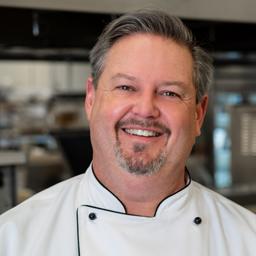To balance the intensely emotional demands of her job as a bereavement counselor at City of Hope, Deborah Salgia moonlights as a health and wellness coach. “It helps keep me level,” she explained.
When she heard about the Savoring Hope healthy cooking classes being offered on campus, this self-proclaimed foodie signed up right away.
“I spend six hours a day in the kitchen,” said Salgia, “and I am so inspired by the changes I see, how City of Hope is taking a more integrative approach to health and well-being.”
Led by Chef Christian Eggerling, City of Hope’s director of culinary operations, Savoring Hope classes combine sophisticated techniques, high-quality ingredient selection and prep tips to create mouth-watering, restaurant-quality dishes jam-packed with nutrients, a far cry from stereotypical “hospital food.” Even better, each class features a nutritionist breaking down the recipe, ingredient by ingredient, so everyone can understand the nutritional component.
Originally conducted in person and later (since the pandemic) online, Savoring Hope has been a big success, but it’s just a small part of a broader effort to integrate nutrition and lifestyle changes into the DNA of cancer prevention.
Much of that effort is powered by a grant from the Conrad N. Hilton Foundation, and it grew out of an auspicious conversation.
“I met with [former Foundation Chairman] Steven Hilton, who’d supported us in the past,” recalled Steven T. Rosen, M.D., City of Hope’s provost and chief science officer, and the Irell & Manella Cancer Center Director's Distinguished Chair. “I’m passionate about nutrition, and he wanted to help.”
A 'Culture of Health'
The result is the Hilton Partnership, aimed at creating a “culture of health” on the Duarte campus and beyond into the surrounding community.
Perhaps the idea of hosting cooking classes at a cancer hospital sounds a little unusual. But only until you realize what’s really going on.
“When you’re cooking healthy and eating well, the healing process is better,” explained Nancy Clifton-Hawkins, M.P.H., who oversees the Hilton programs in her role as City of Hope’s senior manager of community benefit. She points out how helpless and out of control a cancer patient can feel during treatment. Improving your eating habits, she says, “is one of the few things you can control.”
Some of that control takes root even before anyone enters the kitchen. Tucked away in the corner of a parking lot, another Hilton-sponsored program is thriving. The Garden of Hope, conceived by Clifton-Hawkins in 2018, is a community space where anyone — patients, staff, volunteers and visitors — can stop by 24/7 to help grow fresh food or harvest it. Eggerling uses the garden’s 30 varieties of organic produce in his recipes and to stock the various salad bars on campus, while everyone else discovers the benefits of interacting with nature, and with each other.
“When you nurture a garden,” said Clifton-Hawkins, “you nurture yourself.”
Bringing Healthy Food to Schools
And why should the nurturing stop at the campus border? Mindful of the mission of a comprehensive cancer center, which includes community outreach, the Hilton programs have expanded into area schools. A thriving Farm Lab now graces nearby Arroyo High School in El Monte. Students can grow their own organic food and learn about the health benefits of urban green spaces. Plans are underway to replicate the Farm Lab in other schools and design a special urban farming curriculum for the entire El Monte Union High School District.
Other programs reach out to even younger kids, while helping local food deserts bloom. Pop-up farmers markets at several elementary schools are making affordable, fresh fruits and vegetables available to families unaccustomed to finding such healthy fare in their neighborhoods.
“This program started with a school right across the street from City of Hope,” explained Clifton-Hawkins. “We wanted to teach the kids where food comes from. In the process, we trained fifth- and sixth-graders to run these pop-up markets. It’s been an incredibly positive experience.”
Ingesting the right foods is one piece of an important puzzle. City of Hope also runs the Eat, Move, Live! program, a series of five- and 12-week courses (again, now online) that teach nutritional skills such as reading food labels while also offering fun physical activities such as dance and Zumba. The Nutrition for Healthy Lifestyles program helps participants learn to manage a chronic condition — such as diabetes — through a six-week class and support group system developed by researchers at Stanford University.
“We’re trying to create transformational change,” said Clifton-Hawkins, “and not just talk at people. We want them to retain these skills.”
'Body and Soul'
And, as it turns out, the “transformational change” works both ways, because the Hilton programs are enhancing the City of Hope brand, reinforcing the “body and soul” philosophy at the core of the institution.
“We should be all about prevention as well as treatment,” stressed Rosen.
Salgia, the foodie who embraced the Savoring Hope classes, couldn’t agree more. She’s been campaigning for this kind of healthy lifestyle/disease prevention outreach for a long time. Surveying the Hilton offerings, she feels vindicated.
“We’re meeting folks right where they’re at, helping them optimize their health,” she said. “I’ve always believed in the power of healthy eating, especially in a cancer hospital.”
“And now people are speaking my language!”

